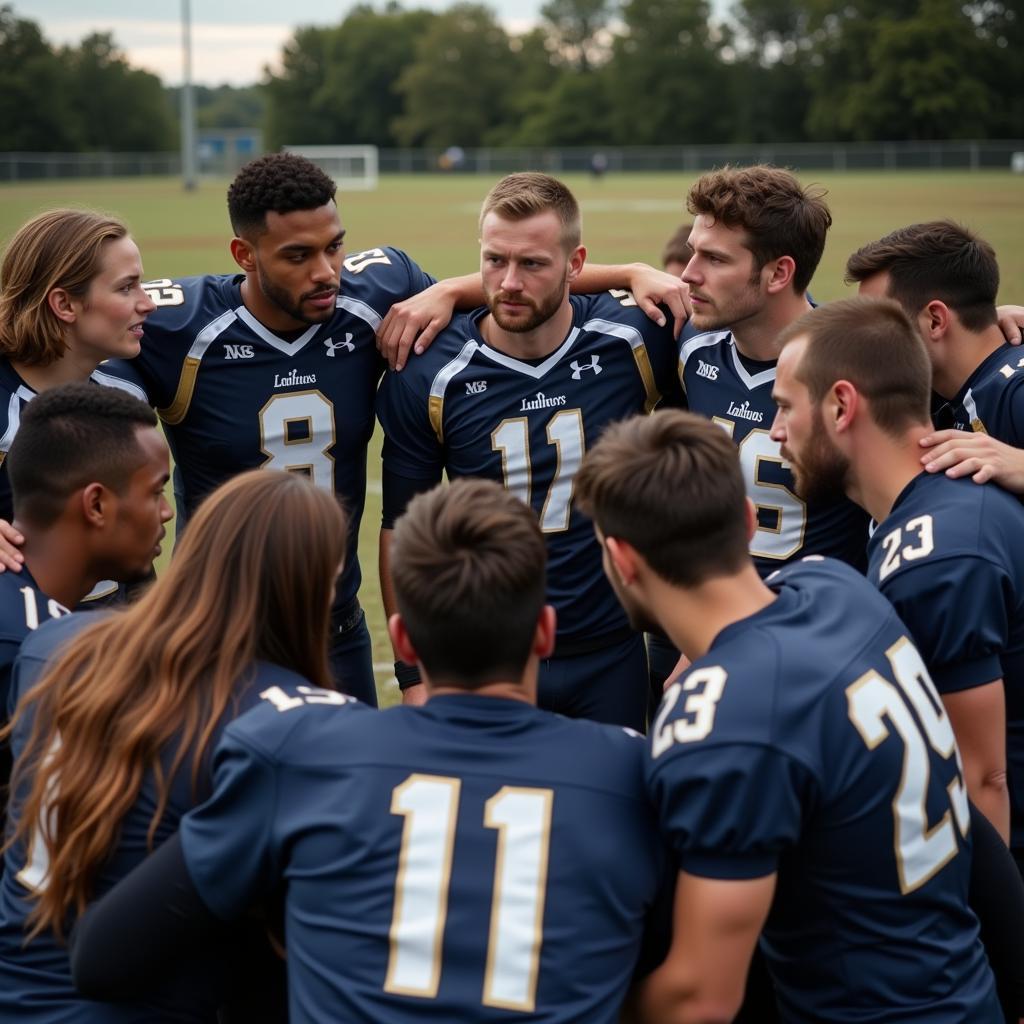Football, much like any team sport, thrives on the collective effort of its individual members. However, simply gathering a group of skilled players doesn’t guarantee success. What truly sets apart a good team from a great one is the strength of its internal bonds, its shared vision, and its unwavering sense of unity. This is where the power of Football Team Building comes into play.
 Football Team Huddle
Football Team Huddle
Why Football Team Building Matters
Football team building activities go beyond the x’s and o’s of the game. They focus on fostering trust, communication, and camaraderie among players, creating a positive and supportive environment where individuals can thrive. When teammates feel connected on a personal level, they are more likely to:
- Communicate effectively on and off the field: Open communication channels allow for clear instructions, timely feedback, and constructive criticism, ultimately leading to better decision-making during crucial moments of a game.
- Support each other through challenges: A strong team spirit empowers players to face setbacks with resilience, knowing they have a reliable support system to fall back on.
- Work collaboratively towards shared goals: When players are united by a common purpose, they are more likely to put aside individual differences and prioritize the team’s success above all else.
Effective Strategies for Football Team Building
Building a winning team takes time, effort, and a well-structured approach. Here are some proven strategies to elevate your football team’s synergy:
1. Communication and Trust Exercises:
- Blindfolded Obstacle Course: This classic exercise requires players to guide each other through an obstacle course using only verbal communication. It emphasizes the importance of clear instructions, active listening, and trust in one’s teammates.
- Team Juggling: This seemingly simple activity involves tossing multiple objects around the circle, requiring players to pay attention, anticipate movements, and communicate effectively to avoid dropping the ball.
2. Problem-Solving and Strategy Development:
- Escape Room Challenges: Escape rooms present complex puzzles and challenges that demand teamwork, critical thinking, and effective communication to solve.
- Game Film Analysis Sessions: Analyzing previous game footage together allows players to review strategies, identify weaknesses, and brainstorm solutions as a team, promoting a shared understanding of the game plan.
3. Team Bonding Activities:
- Team Dinners and Social Gatherings: Informal settings outside of practice and game days allow players to connect on a personal level, build relationships, and strengthen team bonds.
- Volunteering and Community Service: Engaging in community service projects as a team fosters a sense of shared purpose, promotes empathy, and encourages players to work together towards a common goal beyond the football field.
Sustaining Momentum: Long-Term Team Building
Effective team building is not a one-time event but an ongoing process. Here’s how to keep the momentum going:
- Regular Team Check-ins: Schedule regular team meetings to discuss progress, address concerns, and reinforce team values.
- Peer Recognition and Appreciation: Encourage a culture of appreciation by creating opportunities for players to recognize and celebrate each other’s contributions.
- Leadership Development: Empower players to take on leadership roles within the team, fostering a sense of ownership and accountability.
Conclusion
Football team building is an investment in your team’s success, both on and off the field. By incorporating these strategies, you can create a positive, supportive, and high-performing team environment where players feel connected, motivated, and driven to achieve their full potential. Remember, building a winning team extends beyond individual talent; it’s about nurturing the collective spirit and fostering a shared commitment to excellence.
FAQ
1. What are the benefits of football team building activities?
Football team building activities enhance communication, build trust, and foster a stronger team spirit, ultimately leading to better performance on the field.
2. How often should we conduct team building activities?
The frequency of team building activities depends on your team’s needs and schedule. Aim for at least one dedicated team building session per month, supplemented by smaller activities integrated into regular practices.
3. Can team building activities help address conflicts within a team?
Yes, team building activities can help address conflicts by improving communication, promoting empathy, and providing a platform for players to resolve issues constructively.
4. What are some key qualities of a successful team leader in football?
Successful team leaders in football possess strong communication skills, inspire confidence, lead by example, and foster a positive and supportive team environment.
5. How can we measure the effectiveness of our team building efforts?
Observe improvements in team communication, collaboration, and overall performance. Additionally, solicit feedback from players and coaches to gauge the impact of team building activities.
Interested in exploring more resources for building a winning team? Check out these articles:
- Hsc Football Roster
- Dynasty Elite Football
- College Ultimate Team 25 Database
- Entrance Songs For Football
- Songs About Team Building
Need further assistance? Our team is here to help!
Contact us:
Phone: 0902476650
Email: [email protected]
Visit us:
139 Đ. Võ Văn Kiệt, Hoà Long, Bà Rịa, Bà Rịa – Vũng Tàu, Việt Nam.
We have a 24/7 customer support team ready to assist you.





